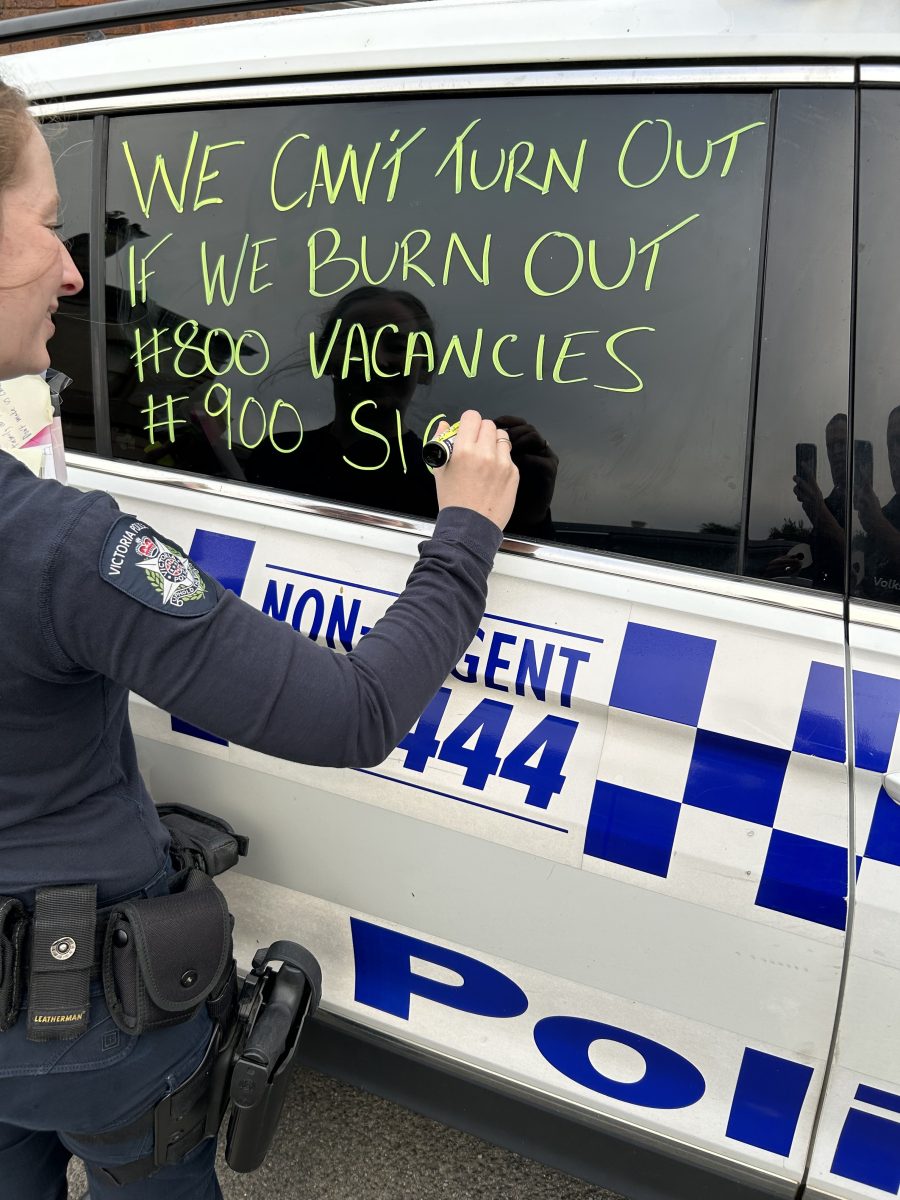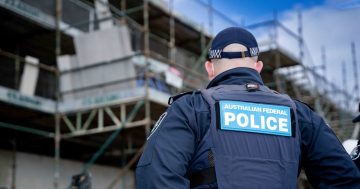
ACT Policing vehicles could soon bare slogans – similar to what’s been seen by Victoria Police (pictured) – after union members voted for protected industrial action. Photo: Supplied / The Police Association of Victoria.
Australian Federal Police (AFP) union members – including ACT Policing officers – have overwhelmingly voted in favour of industrial action in light of frustrations over pay and conditions negotiations.
Action is set to begin on Friday, 22 March.
They’re locked in to an 11.2 per cent increase over three years, which AFPA representatives have argued is a result of the “restrictiveness” of non-APS bargaining parameters and the Commonwealth’s Public Sector Workplace Relations Policy 2023 leaving them “hamstrung” when it comes to trying to get new allowances.
Union members voted on 36 potential actions which range from putting slogans on AFP vehicles and uniforms and blocking mobile speed vans, to not attending court matters, not transporting alleged offenders, and not investigating any referrals to the AFP from the offices of politicians where no offence has been committed.
The protected industrial action ballot returned a 96.73 per cent ‘Yes’ vote from 3211 members.
“This result sends an extremely strong message to the Federal Government and Australian Public Service Commission (APSC) that AFPA and AFP members are prepared to take action to get better workplace conditions and wages than those currently on offer,” AFPA president Alex Caruana said.
“These members should not be treated the same as traditional public servants and should not be consigned a blanket pay rise which doesn’t properly remunerate them as serving police officers.”
The union has argued the psychological and physical risks that police officers are exposed to each day mean they should not be consigned to the same pay and conditions as other public servants.
“Do other public servants get shot at? Do other public servants get assaulted for doing their job? What other public servants have their decisions and integrity scrutinised as heavily as AFP members do?” Mr Caruana asked.
“These are questions that the Federal Government knows the answer to, but chooses to ignore.”
He also pointed out that AFP officers were the lowest base-paid police officers in the country which was making recruitment and retention difficult.
“These are the same members who protect Parliament House, the same members who would take a bullet for the Prime Minister and other politicians and the same members who will be tasked with protecting AUKUS assets and infrastructure now and into the future,” Mr Caruana said.
“For the AFP to recruit the best and brightest, it needs to be competitive in the market. Today, every other police service can say it pays a better base wage to members starting their careers than the AFP does.”
Assurances have been given to the community that their safety will not be put at risk due to the protected industrial action options on the table.
Mr Caruana said AFPA members would still respond to incidents and would not be forming picket lines.
“That is not how we operate. Community safety will remain a priority,” he said.
“We encourage all members to continue to work to the best of their ability, and if a safe opportunity arises where protected industrial action could be employed, then we will consider it.”
The union will be required to give notice ahead of any planned action.
Region sought comment from Senator Katy Gallagher’s office in her capacity as Public Service Minister, which was referred to the Attorney-General’s office (as the AFP sits under his portfolio).
It was suggested comment should instead be sought from the AFP, given negotiations are occurring between that outfit and the union.
An AFP spokesperson said bargaining had been occurring between the organisation, the union, the CPSU and other independent bargaining representatives since September 2023, and it intended to keep “working constructively” to reach a resolution.
“The AFP remains intent on going to a vote for a new enterprise agreement before the 25 May 2024,” they said.
“The AFP has put in place contingency plans to ensure there are no disruptions to operational capability, and no impacts to community safety.”
Original Article published by Claire Fenwicke on Riotact.










